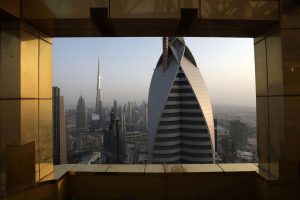
Asia wealth managers setting up office in Dubai as clients look to diversify
HONG KONG/SINGAPORE — A growing number of wealth managers in Asia are setting up offices in Dubai, capitalizing on warming diplomatic ties between China and the Middle East and betting on a surge in demand from clients for geographical diversification.
Dubai, a major financial hub in the Gulf region, is emerging as a preferred wealth hub for many entrepreneurs and rich families in Asia, mainly China, as they look to take advantage of favorable policies and expand their businesses, wealth managers said.
Noah Holdings, one of China’s top wealth managers overseeing round $23 billion in client assets, for example, is expecting to get a business license in Dubai by the end of this year, said Qing Pan, its chief financial officer.
The Dubai office will serve Chinese entrepreneurs who are setting up their businesses in that market, he said.
“Noah’s strategy has been following the growth of clients’ wealth. That’s why we will have to be there and take care of the wealth generated locally,” Mr. Pan said, adding that the firm plans to send some staff from China first and recruit locally later. “Many Chinese entrepreneurs are looking for new markets and diversifying their supply chains, and many are excited by the opportunities offered by the Middle East.”
The Middle East has grown increasingly important to Beijing as its ties with Washington have soured amid disagreements on a range of issues from trade and technology to human rights and Taiwan.
A post-COVID economic rebound, neutral political stance, ease of doing business, convenient time zones, and tax-free status have all contributed to the Middle East attracting droves of wealthy individuals in recent years.
The United Arab Emirates (UAE) has in the recent past introduced incentives such as the ‘golden visa’ system. Dubai launched a ‘family wealth center’ last year to help wealthy individuals and businesses deal with cultural issues and governance.
As a result, western wealth managers including Swiss private bank Lombard Odier are looking to expand their business presence in the region to tap into the influx of expatriates and growing population of rich individuals.
INVESTMENT OPPORTUNITIES
In Asia, Hong Kong and Singapore have long been the most preferred offshore wealth hubs for rich individuals. But some clients are now looking to diversify into other markets and get exposure to new investment opportunities, said wealth managers.
The global number of high-net-worth individuals (HNWI) fell 3.3% to 21.7 million in 2022, but the Middle East’s HNWI population increased 2.8% in the same year, according to Capgemini’s 2023 wealth report.
The UAE saw the highest net inflow of millionaires in the world in 2022, and the private wealth hub was estimated to have received a net inflow of another 4,500 in 2023, according to data from Dubai-based wealth and immigration adviser Henley & Partners.
Betting on the trend, Singapore-based multi-family office Farro Capital set up an office in Dubai last month. Patrick Tsang, chairman of Hong Kong-based single family office Tsang Group, said the firm was planning to launch new offices in Abu Dhabi and Saudi Arabia’s Riyadh this year after its Dubai foray in 2022.
Hong Kong-based Landmark Family Office is also planning to set up an office in Dubai in the coming months. Landmark’s founder and CEO Cameron Harvey said the firm’s Dubai office would be used to help clients based in China, Southeast Asia, and Australia find investment opportunities in the Middle East.
A recent survey of 76 Asia Pacific-based single and multi-family offices, done by Campden Wealth and Raffles Family Office, found average asset allocation to the Middle East region at only 1%, with 7% of the respondents planning to increase that.
“We live in very interesting times where geopolitics have become more critical to families than ever before,” said Manish Tibrewal, co-founder of Singapore’s Farro Capital, adding Dubai’s push to regulate virtual assets, and the golden visa system, among others, have enhanced its appeal. — Reuters
